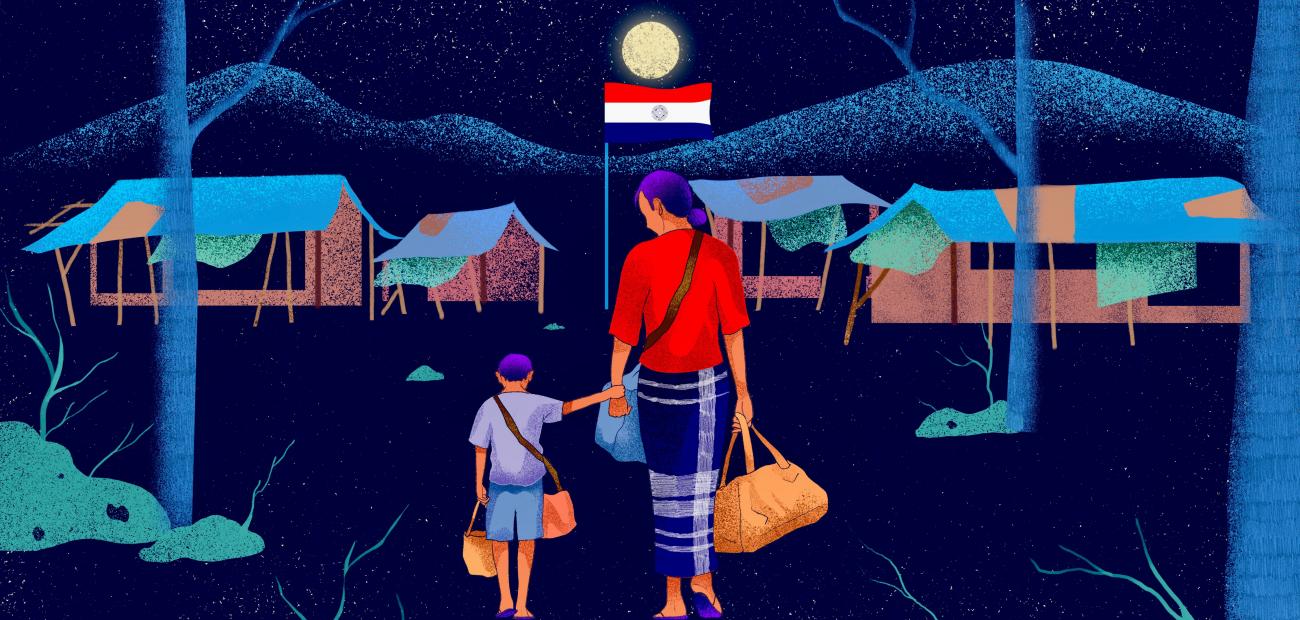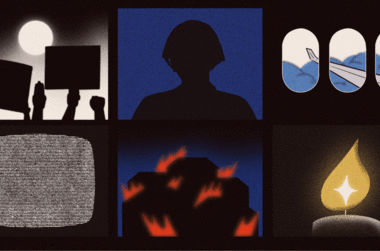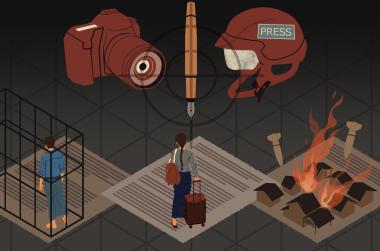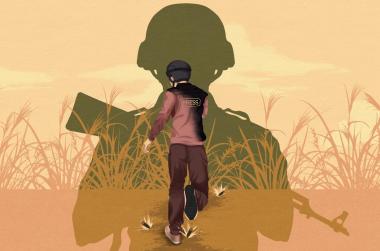The author is a Kayah journalist who is receiving support from The Kite Tales to write these diaries.
Hundreds of tarpaulin-covered huts stand in neat little rows in a jungle near the border with Thailand, home to more than 2,000 people who have fled the fighting between Myanmar’s military and revolutionary forces. Many of the people here used to work in offices or schools. To get here, they had to walk for more than a week through the forests and mountains that separate this place from the main part of Karenni (Kayah) state.
Located in an area controlled by the Karenni National Progressive Party (KNPP), it is a safe haven for those who made it here. But life here is harsh. Because of its remote location, water is scarce and transportation is difficult, which makes it challenging to bring food in.
It was at this refugee camp that I met a woman living in one of the simple shacks with her 11-year-old son. Before the military seized power last year she had been a high level official in an education department. Now, like so many others who joined the civil disobedience movement, her life has been upended, her days disfigured by worry.
"Are you okay, Sayamagyi?” I asked as we sat in her home.
(Note: ‘Saya/Sayama’ is directly translated as teacher but is often used as a term of respect)
“People provide and look after me. I am completely safe,” she said.
But while the camp staff and local community can provide for basic needs, they can do little to ease the deep anxiety that haunts her.
Her husband, who also joined the civil disobedience movement, was arrested last October.
“I still don't know whether he is dead or alive,” she told me, wiping away tears.
“I am very distressed.”
She said that we all have to fight together so that future children won’t have to go through what this generation has suffered.
I encouraged the teacher to stay strong, but there was nothing else I could do beyond that.
I remember seeing many government workers during the huge protests held in the Kayah State capital Loikaw a few weeks after the February 2021 coup.
They came wearing their uniforms and they stood under the hot sun in the field where we normally host the annual state festival, holding the flags of their various government departments in defiance of the military.
I had never witnessed such a scene before in my life, so I was both surprised and awed.
Their decision not to continue to work was decisive in preventing the military-governed bureaucracy from functioning normally.
Soon after that, the military council issued temporary suspension orders to staff taking part in the civil disobedience movement (CDM) and in the following months, they started to issue dismissal letters.
The CDM campaign has now been going on for a year and a half and continues to be strong and effective. But there is also sadness and suffering.
I have met many families who are struggling. Many of those who took part in the resistance movement are jobless, on the run, fearing prison or worse at the hands of the military.
For example, one married couple I have spoken to - both government workers who took part in the CDM – have spent months travelling through strange towns, living in other people’s homes. They have no work and they feel very small.
Another CDM teacher with four children saw the family’s money run out as her husband spiralled into alcoholism. There was no rice, no oil, there was the danger of COVID-19 pandemic and before long the husband became violent.
Luckily a women's organisation was able to intervene and provide the teacher and her children with a safe haven.
At the refugee camp I met another teacher, who told me that she had high blood pressure and arthritis, and that her health had deteriorated while she was sleeping in the forest and eating poorly. The medicine she needed had run out at the camp.
Despite their very different circumstances, all of these individuals have told me of their determination to continue to work to help the resistance in Myanmar. They say the revolution must win.
I admire these heroic CDM staff facing war and hunger for the sacrifices they have made and I think that as long as they stay strong, it will be difficult for the military to rule the people. I’m convinced the dictatorship will not last long.
Artwork by Songbird who is receiving support from The Kite Tales to produce illustrations.





